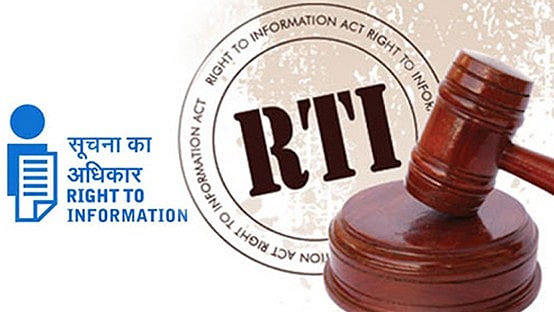
RTI.
Credit: RTI Rajasthan portal
The Right to Information (RTI) Act came into effect two decades ago, following which the Karnataka Information Commission (KIC) was established on July 30, 2005. The Commission currently comprises the State Chief Information Commissioner and ten Information Commissioners, with permanent benches in Kalaburagi and Belgavi to ensure quicker disposal of appeals at the local level.
Each year, five to six lakh RTI applications are filed across the state, both online and offline, under Section 6(1) of the Act. During 2024-2025 alone, the KIC received 30,821 second appeals under section 19(3) (of which 4,516 were online) and 1,910 applications under Section 18(1) requiring inquiry into complaints filed by any person.
While it disposed of 15,497 applications under second appeal, 1,483 complaints filed under Sec 18 were disposed of, imposing penalties Rs 33,11,000 on Public Information Officers for delays in providing information. It also awarded compensation of Rs 12.16 lakh to 112 appellants under Section 19(8)(b) for loss or detriment faced caused by denial or delay.
The volume of second appeals filed in the Commission has grown exponentially – from 17,204 in the year 2020-2021 to 30,821 in 2024-2025. The highest number of applications comes from the departments of Rural Development and Panchayath Raj, Revenue, Urban Development, Social Welfare, Home, Water Resources and Forests. Among districts, Bengaluru Urban and Rural top the list, followed by Belagavi, Bagalkot, Davengere, Kolar, Mandya, and Vijaynagar.
As the RTI Act marks its twentieth year, it is time to reflect on how far India has advanced towards the vision envisaged in its Preamble – an informed citizenry, transparency of information to contain corruption, and accountability of governments to the governed.
The RTI Act deepened the participatory nature of Indian democracy by empowering citizens and making officials more accountable. The Right to Life under Article 21 has been interpreted to include the Right to Know, and the Supreme Court’s 2017 Puttaswamy Judgement affirmed that the Right to Privacy is essential to personal liberty. Together, these rights –knowledge, information, education, and privacy –form the pillars of transparent and accountable governance.
The RTI framework enables any citizen to seek information by filing applications under Section 6(1), appeals under Section 19, and complaints under Section 18. Information must be provided within 48 hours if it is related to human rights violations or corruption (Section 7). The Severability clause (under Section 10) allows partial disclosure by redacting exempt portions, while Section 8 protects privacy of and national interest by exempting matters related to sovereignty, court of law proceedings, parliamentary privilege, foreign affairs or the safety of individuals. Qualified exemptions – such as commercial and trade secrets or fiduciary records, Cabinet papers, Person information–may still be disclosed in larger public interest. Section 11 restricts disclosure of third-party information without consent. Thus, the RTI Act strives to balance the citizen’s right to know with legitimate privacy and security concerns.
The biggest shortcoming in RTI implementation remains the lack of proactive disclosure of information mandated under Section 4, which lists various categories of information that must be made public without any RTI request. It also prescribes the manner in which the information should be provided. Compliance with this section could reduce applications by nearly 70%, easing the burden on departments and curbing inefficiency and wrong doing. Yet, a recent survey found that most government departments have failed to comply, despite repeated directives.
In August 2023, the Supreme Court directed the Central and State Information Commissions to monitor the implementation of Section 4 amd ensure adherence to government guidelines.
Another major challenge is the volume and vagueness of requests. The High Court of Karnataka, in the Department of Agriculture vs KIC, held that applications lacking purpose or seeking voluminous, non-specific data may be rejected to prevent waste of time and public resources. Repeated or frivolous applications filed by the same individual also block genuine users’ access. The CIC has advised public authorities to record such abuse and recommend non-entertainment of repetitive requests.
Delays in disposal of applications often stem from delay in appointment of Information Commissioners. The KIC, now functioning at near-full strength, has improved disposal rates–over 10,000 cases have been cleared this yes–helped by regular hearings and voluntary disclosure by PIOs after several workshops conducted in districts.
The Supreme Court, in CPIO vs S C Aggarwal, clarified that neither the right to information nor the right to privacy is absolute. The RTI Act contains a finely tuned balancing of interests, and privacy concerns of third parties cannot be disregarded without giving them an opportunity to object. Applicants, in turn, must seek information with precision and clarity.
Denying citizens access to vital information, however, impedes democratic processes and restricts access to essential services. As the Court noted in State of Gujarat vs Mirzapur Moti Kasab Jamaat & Ors, public interest encompasses public order, public health, public security, morals, economic welfare of community as well as the objects mentioned in Part IV of Constitution. RTI must continue to function as an enabler of transparency and accountability, not merely as a procedural tool.
(The writer is the Karnataka Chief Information Commissioner and a retired DGP)
Disclaimer: The views expressed above are the author's own. They do not necessarily reflect the views of DH.